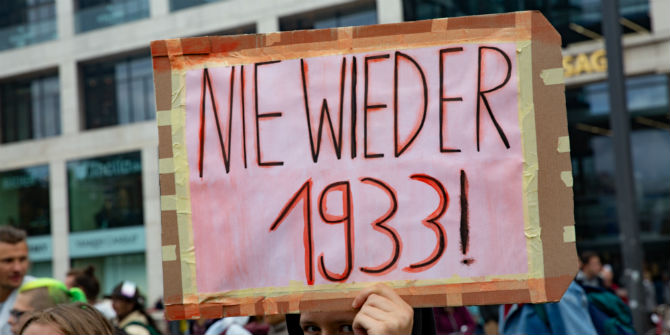The gridlocked Brexit talks may be kicked into the long grass, write Ros Taylor and Roch Dunin-Wąsowicz (LSE).
The bad news? No progress in Brexit talks. “Our lack of progress in these negotiations is not due to the method, but the substance,” Michel Barnier said today, adding that the UK had ‘backtracked‘ on the Political Declaration.
The good(ish) news? There’s no point in worrying about it until September, when the EU (and Angela Merkel, since Germany will by then hold the EU presidency) will call in Boris Johnson to get a deal done. That’s the gist of the Guardian’s report, which points out a summit is due on 15 October.
Clear from this Barnier statement that there will only be progress on Brexit when Johnson engages personally. Probably needs another Walk in the Woods moment, but not with Varadkar this time.
My money is on that role going to Macron this time.— Rafael Behr (@rafaelbehr) June 5, 2020
UK believes ticking clock will force EU into concessions. EU thinks ticking clock will force UK into concessions. Both sides genuinely believe this – so neither has big incentive to move until last minute – which is why negs will go the wire & risk of an accident is high
— Mujtaba Rahman (@Mij_Europe) June 4, 2020
Persuading people that a last-minute deal is feasible would, of course, ease the pressure to agree an extension to the transition period by the end of June. That isn’t the FINAL FINAL deadline, but it is the easiest to obtain, according to a comprehensive Institute for Government briefing on the subject. It points out, as many others have, that businesses need time to prepare for a no-deal outcome, particularly after the blow of COVID-19.

Which regions would suffer most? A report by the Social Market Foundation finds the north-west and Midlands would be most exposed to the ‘double economic hit’.
📣 OUT TODAY 📣 New analysis from the SMF's @PetrieKathryn and @amye_norman reveals the "double impact" of coronavirus and Brexit on individual sectors and localities.
Read the report: https://t.co/j0FCn0pt8U
— Social Market Foundation (@SMFthinktank) May 31, 2020
Brendan Donnelly, of the Federal Trust, writes that the possibility of a no-deal Brexit was underestimated for a long time. How “No Deal” became the bookies’ favourite.
A few weeks ago we reported the FT’s suspicion that the economic damage caused by the pandemic would be used to ‘disguise’ that of a no-deal Brexit. Mujtaba Rahman agrees.
Contrary to earlier suggestions that Nissan would be increasing its car production in Sunderland regardless of the Brexit outcome, the company indicated this week it needed tariff-free access to the EU market.
Meanwhile, the FT has a long and interesting read on the opportunities and fears of UK farmers.
On top of it all, POLITICO reports that the UK and EU are entangled in a row “over up to €300 million in U.K. contributions to the EU’s emergency coronavirus fund”.
LSE Brexit
The Brexit car crash: using EH Carr’s What is History? to explain the result
Finally, Boris Johnson has appealed to Central-Eastern Europeans who left the UK at the beginning of the pandemic to return:
“We want you back”
PM Boris Johnson invites European workers who left the UK as lockdown began to return now it is being eased and retail sector is reopeninghttps://t.co/J6MTHfU6Kp pic.twitter.com/2WX5jswZYe
— BBC News (UK) (@BBCNews) June 3, 2020
🤔






